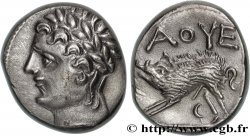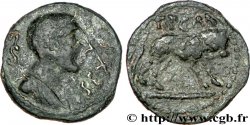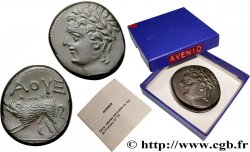bga_116395 - CAVARII (Area of Avignon and Orange) Bronze au taureau T.POM / SEX.F
Not available.
Item sold on our e-shop (2011)
Price : 60.00 €
Item sold on our e-shop (2011)
Price : 60.00 €
Type : Bronze au taureau T.POM / SEX.F
Date: Ier siècle avant J.-C.
Metal : bronze
Rarity : R2
Coments on the condition:
Flan court et irrégulier. Patine verte légèrement granuleuse. Droit piqué et mal frappé
Catalogue references :
Obverse
Reverse
Commentary
Le revers est bien centré et complet, avec la légende T.POM. Ce type de bronze est attribué de manière incertaine à divers peuples de la Narbonnaise.








 Report a mistake
Report a mistake Print the page
Print the page Share my selection
Share my selection Ask a question
Ask a question Consign / sell
Consign / sell
 Full data
Full data



